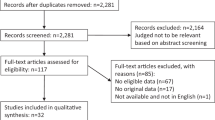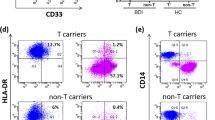Abstract
Disturbances of events associated with intracellular signaling pathways have been suspected of involvement in the development or progression of affective disorders. Often, heterotrimeric G proteins are located at the beginning of these pathways as modulators of extracellular messages. For this reason, messenger RNA expression of three G protein α-subunits and of phosphatidylinositol-3 kinase (PI-3 K) regulatory subunit p85 was examined in granulocytes from patients with bipolar or unipolar affective disorder and compared to healthy controls. Messenger RNA expression of the G protein subunit αq and of p85 was identical in unipolar and bipolar patients and in controls. Furthermore, mRNAs of G protein subunits αs and αi2 were not different in unipolar patients as compared to healthy controls. Alphas mRNA, however, was markedly increased in bipolar patients. This increase was observed in lithium-treated (more than 12 months) and in unmedicated patients. Elevated levels of αi2 mRNA in unmedicated bipolar patients did not reach statistical significance, whereas mRNA in bipolar patients receiving lithium was significantly above controls. Finally, long-term medication of unipolar patients with lithium had no influence on αi2 mRNA levels. The data reveal elevated mRNA levels of Gαs as a robust feature of bipolar affective disorder. Moreover, despite responsiveness of αi2 gene expression to cAMP-related events, no substantial upregulation of αi2 mRNA was observed in bipolar patients. The lack of αi2 mRNA upregulation, hence, could be an additional abnormality in these patients. Even though lithium was able to reinstate this upregulation, there was no feedback downregulation of αs. This strongly supports the notion of major disturbances of the cAMP signaling system in bipolar illness.
This is a preview of subscription content, access via your institution
Access options
Subscribe to this journal
Receive 12 print issues and online access
$259.00 per year
only $21.58 per issue
Buy this article
- Purchase on Springer Link
- Instant access to full article PDF
Prices may be subject to local taxes which are calculated during checkout
Similar content being viewed by others
Author information
Authors and Affiliations
Corresponding author
Rights and permissions
About this article
Cite this article
Spleiss, O., van Calker, D., Schärer, L. et al. Abnormal G protein αs- and αi2-subunit mRNA expression in bipolar affective disorder. Mol Psychiatry 3, 512–520 (1998). https://doi.org/10.1038/sj.mp.4000393
Received:
Accepted:
Published:
Issue Date:
DOI: https://doi.org/10.1038/sj.mp.4000393
Keywords
This article is cited by
-
Genetic association of cyclic AMP signaling genes with bipolar disorder
Translational Psychiatry (2012)
-
Genetic tests of biologic systems in affective disorders
Molecular Psychiatry (2005)
-
Affective disorders, antidepressant drugs and brain metabolism
Molecular Psychiatry (2003)
-
Post-receptor signaling pathways in the pathophysiology and treatment of mood disorders
Current Psychiatry Reports (2000)
-
Genetics of bipolar affective disorder
Current Psychiatry Reports (2000)



